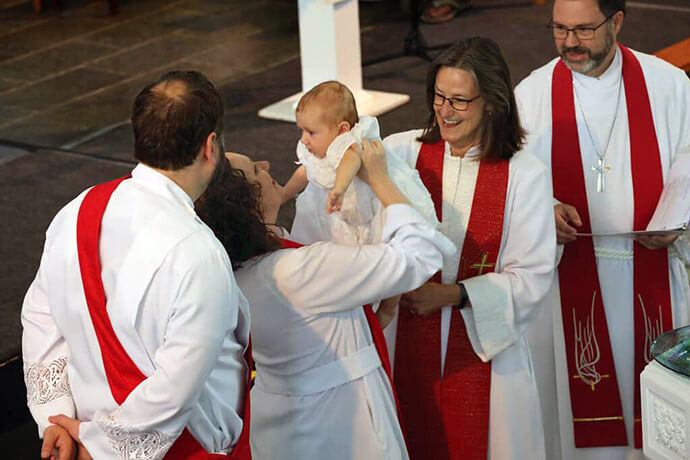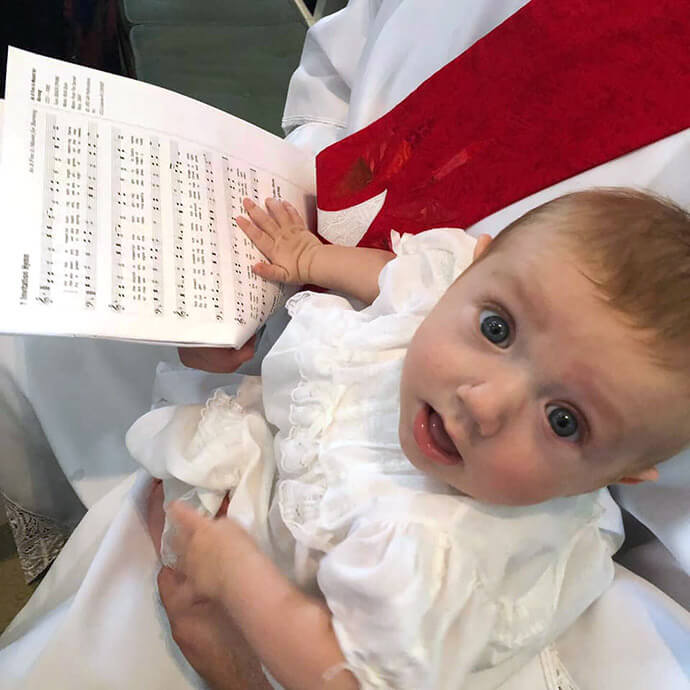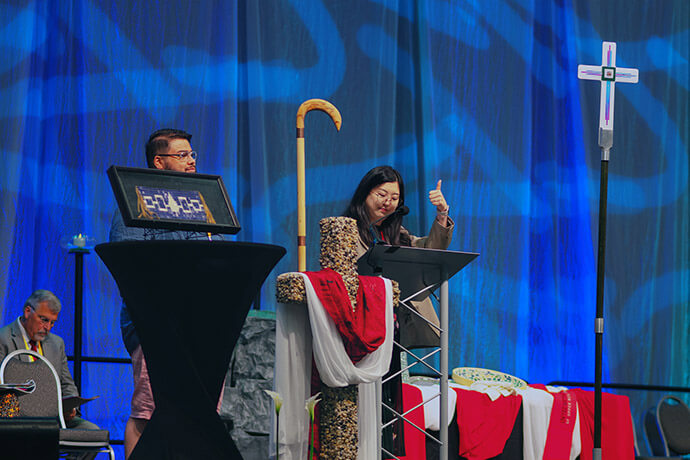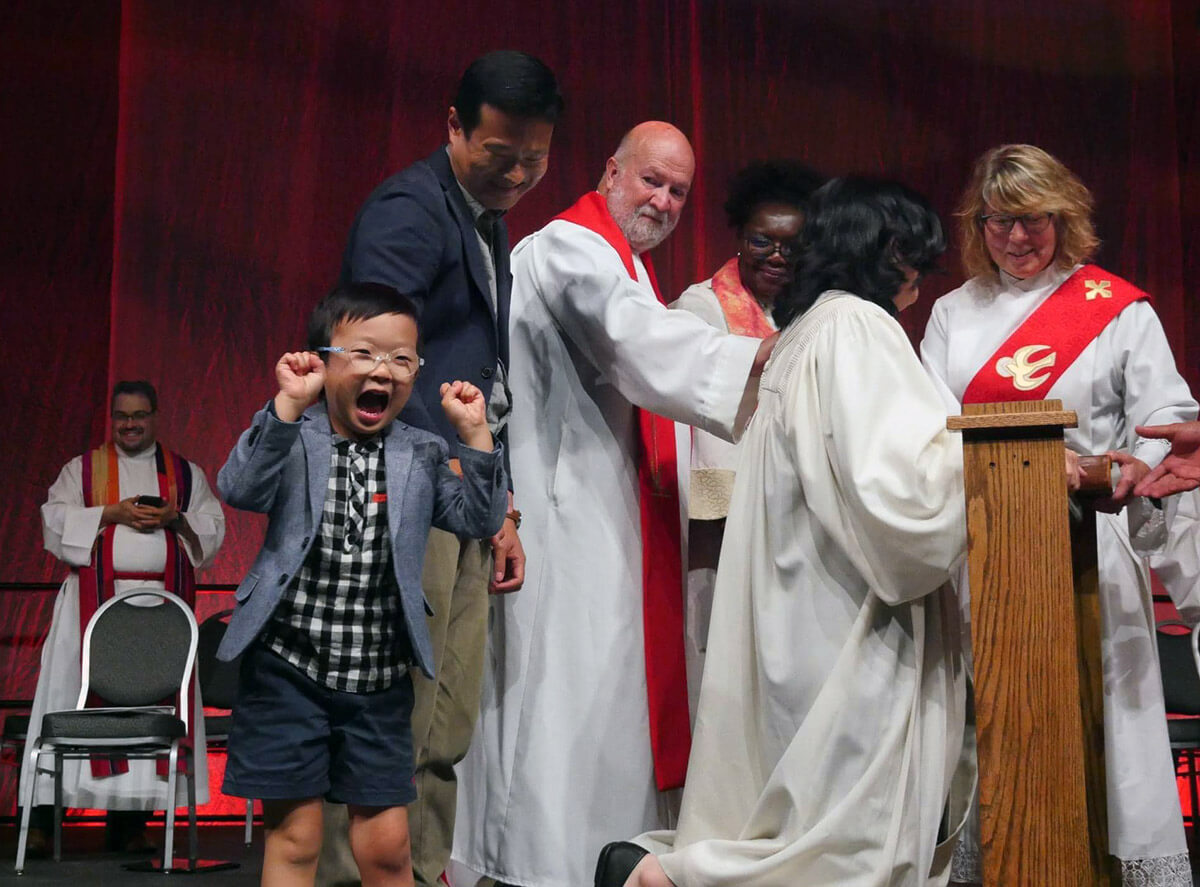Key Points:
- Clergy should get 13 weeks of paid leave if they’re taking care of a new baby, according to members of a grassroots effort to make that the United Methodist standard.
- Some United Methodist pastors report resistance to being granted paid maternity or paternity leave.
- An effort to expand parental leave coverage without increasing the financial burden on local churches is ongoing with the assistance of the United Methodist Commission on the Status and Role of Women.
- Annual conferences are being lobbied about the issue at their meetings this year and next.
Two weeks after giving birth, the Rev. Roslyn Lee drove 90 minutes each way to preach at the church she was serving.
“(The) staff-parish relations committee said it’s a part-time position, so (I) wouldn’t be getting maternity leave,” Lee remembered. Her husband, a hospital chaplain who co-pastored the same church, had no difficulty getting paternity leave from the hospital.
“My husband and I were alternating (preaching) every other week,” she said. “He had preached the first week, and it would have made sense if he just covered the rest of the month.”
But leaders of the small, elderly congregation were insistent that she needed to be there when it was her turn, so she did it.
“I actually ended up in the hospital after that,” said Lee, who today is the pastor of Commack United Methodist Church in Commack, New York. She then opted to use her annual two weeks of vacation for her recovery, plus the couple paid a seminary student out of their own pocket to cover an additional week.

The Rev. Diane Kenaston, a United Methodist elder and consultant who trains pastors to become more effective, is helping lead an effort to improve parental leave policies in the denomination with assistance from the United Methodist Commission on the Status and Role of Women. Lobbying has been happening at annual conference meetings this year and will continue into 2025.
“We basically want to expand parental leave coverage without increasing the (financial) burden on local churches,” Kenaston said.
The United Methodist Book of Discipline stipulates that clergy with a newborn baby have the right to a leave of absence.
“Maternity or paternity leave, not to exceed one-fourth of a year, will be available and will be granted by the bishop and the cabinet, and the executive committee of the Board of Ordained Ministry to any local pastor, provisional member, associate member or clergy member in full connection who so requests it at the birth or arrival of a child into the home for purposes of adoption,” reads part of the relevant passage in the Book of Discipline. It adds that at least the first eight weeks should be paid leave.
“What we are working for is 13 weeks of parental leave,” Kenaston said. “Different conferences interpret one quarter of a year differently. … Many annual conferences have actually specified in their own policies that there’s a maximum of 12 weeks that you can take.”

The World Health Organization advocates for 18 weeks of parental leave, and the U.S. is one of only seven of the 193 United Nations member countries that have no guarantee of paid time off for new parents, said the Rev. Jee Hae Song in a speech presenting parental leave legislation to the Upper New York Conference. Parental leave is also included in the 2020-2024 Book of Resolutions.
According to Kenaston, some conferences are already on board, including the Western Pennsylvania, East Ohio, Illinois Great Rivers, Western North Carolina, Florida, Missouri, New York, Peninsula-Delaware and Upper New York conferences.
“Interested leaders from an additional 20-plus conferences are working on legislation for 2025,” she said.

Male clergy in the denomination have also faced difficulty when trying to take parental leave.
The Rev. Ross Baker, co-pastor with his wife of Emporia First United Methodist Church in Emporia, Kansas, ran into trouble in a previous appointment after one of his children was born. He took six weeks of parental leave.
“The church I was serving at the time was fairly supportive, at least going into it,” Baker said. “It was a large church in an urban setting, and had a lot of folks that worked within the corporate world on my SPRC (staff-parish relations committee).”
Some of those male church leaders hadn’t taken more than a day or two off when their children were born, Baker said.
He believes his absence was held against him by some in the congregation.
“I came back and the senior pastor said that over the course of my time being out, while folks had generally been supportive of it, there had been some email conversations that had been circulating amongst the SPRC members and some of the church leaders around if they felt that I was really the right fit for this congregation,” Baker said. “It was uncertain how much longer I would be able to remain appointed there, because they weren’t feeling like they really had much of a connection with me.”
Learn more
More information about the initiative to gain parental leave for clergy, including talking points and frequently asked questions, can be found on the United Methodist Commission on the Status and Role of women website.
He was offered two options: either stay on and try to mend fences or cut his losses and seek another appointment.
“It was going to require a lot on my part to make sure that I basically fought for my spot to remain there,” he said.
After speaking with his wife, he opted to seek another appointment. That meant his first appointment lasted under a year, which might raise flags when he tries to get appointments in the future.
“It was a pretty hard blow to me, personally and spiritually, and certainly caused some questioning about my effectiveness in ministry,” Baker said.
A major obstacle to granting parental leave is how to pay for it. Many smaller United Methodist churches lack the resources to do so.
“Everyone wants to support children and their families,” Kenaston said. “That is a United Methodist value, and we know that paid parental leave is how we care for one another.
“The biggest question has been finding the source for funding within each annual conference.”
Annual conferences are structured differently. Some can use cabinet funds or “boon funds” — money received from unexpected economic good fortune. Insurance that covers parental leave is another possibility.
Subscribe to our
e-newsletter
“It’s very contextual on exactly where the funds come from,” Kenaston said.
About 40 people are lobbying at annual conferences promoting parental leave. One of them is the Rev. Debbie Allen, superintendent of the South West District in Florida.
“I was drawn to this work because I see it as a justice issue and appreciated the focus on parental leave to encourage and support pastors taking both paternity and maternity leave,” Allen said in a note shared by Kenaston.
Kenaston herself had a good experience taking maternity leave.
“I had a child with no health complications,” she said. “I personally had no health complications, and I had a spouse who was able to take time off from his job.”
Additionally, there had been four female pastors at her church before Kenaston arrived, and the previous female pastor had gotten maternity leave without a fuss.
“I was also a white woman who had privilege in that way,” Kenaston said.
Kenaston was able to take maternity leave without it counting against her standard vacation allowance, she said. Sometimes that is not the case.
“One of our main points is that parental leave is not vacation,” she said.
Patterson is a UM News reporter in Nashville, Tennessee. Contact him at 615-742-5470 or newsdesk@umcom.org. To read more United Methodist news, subscribe to the free Daily or Weekly Digests.




